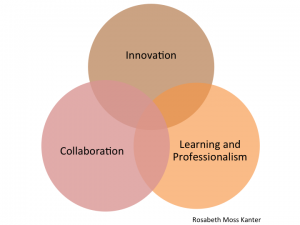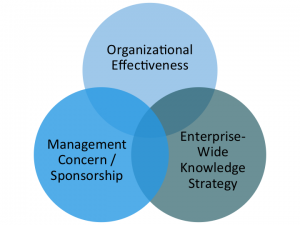Colleague Anne Kershaw and I have been speaking a lot recently about knowledge strategy, about why company and firm leadership needs to think about knowledge strategy. As it happens, the talk Anne and I deliver is focused on that very question (“Why Knowledge Strategy?”) as we seek to dig deep into the overall, enterprise-wide approach to KM, knowledge services, and knowledge strategy. Anne, Co-founder and Managing Director at Knowledge Strategy Solutions, is an expert in this topic, and we really like doing presentations together.
One point that keeps coming up has to do with knowledge services, the management methodology that links together information management, KM, and strategic learning. For many of us – regardless of the kind of knowledge-related work we do – knowledge services provides the foundation for success in all our knowledge development, knowledge sharing, and knowledge utilization activities (what we like to refer to as “KD/KS/KU”). As we put it all together, to get to knowledge strategy, a first question sets up the whole conversation: is the company, law firm, or organization that wants to do more with knowledge strategy ready to move to knowledge services. Does the client organization understand what it means to move forward with knowledge services?
If, as many of us working in this field assert, knowledge services is the practical approach to KM and knowledge strategy development, what are the drivers that move us to think about knowledge services?
I have a couple of ideas, and I would like to share them here and hear back from readers and colleagues to see if you agree with me.
First off, we have to be able to convince the client (or our colleagues if we’re doing this as an in-house consultant) that moving to knowledge services requires very specific new approaches to management and leadership. At the top of the list is a shift to recognizing the value of change management (OK – if your colleagues’ eyes glaze over at the sound of those words, refer to change management as something else: “transition management,” perhaps, or “change implementation” – you know your company and what business language works there.)
Given what’s happening with respect to KM, knowledge services, and strategic learning in businesses and organizations, in the larger environment, and, especially in the global community, it is incumbent for organizations to move to taking the work of the knowledge domain seriously, for organizational leaders to be willing to participate in the transformation of the workplace toward a more knowledge-centric structure. It’s a re-conceptualization of the workplace, and it requires change, a topic we must all deal with.
 And there’s good advice for dealing with change. One of the best approaches came up some years ago, when Rosabeth Moss Kanter began talking about the concept of the “change-adept” organization. While I can’t find the citation at the moment, I do remember that Kanter – of The Change Masters fame – characterized the change-adept organization as constantly investing in innovation, in learning and professionalism, and in collaboration.
And there’s good advice for dealing with change. One of the best approaches came up some years ago, when Rosabeth Moss Kanter began talking about the concept of the “change-adept” organization. While I can’t find the citation at the moment, I do remember that Kanter – of The Change Masters fame – characterized the change-adept organization as constantly investing in innovation, in learning and professionalism, and in collaboration.
Agreeing with Kanter, I assert that these are exactly the characteristics required before any change activity can move forward, particularly if that change activity has to do with what’s going on in the knowledge domain. To move toward knowledge services, the company, firm, or organization will build on Kanter’s three elements to determine the why of the move to knowledge services: (1 the desire – on the part of all organizational stakeholders – to achieve organizational effectiveness, (2 a top-down emphasis on “taking control” of the many issues relating to successful management of the company’s diverse and spread-out-all-over-the-place information, knowledge, and strategic learning frameworks and content, and (3 simply put, because it’s time to do it.
We can give each of these some thought:
- Many of us argue (and Anne Kershaw and I use this construct) that organizational effectiveness begins with an enterprise-wide knowledge culture, built on a knowledge strategy supported by knowledge services and leading to successful KD/KS/KU.
 Enterprise leadership is concerned, so much so that senior managers, corporate executives, and even leaders in organizations and institutions that were not necessarily business-focused are asking for a unified approach to KM and knowledge services. For efficiency and for effectiveness, they want an enterprise-wide knowledge strategy that applies to all strategic knowledge, that will enable the enterprise to access and deliver any content connecting to any part of the organization and, as proclaimed already, to its success. And they are, when approached with evidence-based results that successful KD/KS/KU will come from a well-planned and well-executed knowledge strategy, willing to sponsor knowledge services efforts.
Enterprise leadership is concerned, so much so that senior managers, corporate executives, and even leaders in organizations and institutions that were not necessarily business-focused are asking for a unified approach to KM and knowledge services. For efficiency and for effectiveness, they want an enterprise-wide knowledge strategy that applies to all strategic knowledge, that will enable the enterprise to access and deliver any content connecting to any part of the organization and, as proclaimed already, to its success. And they are, when approached with evidence-based results that successful KD/KS/KU will come from a well-planned and well-executed knowledge strategy, willing to sponsor knowledge services efforts.- As for making the case for moving forward now, rather than waiting, much of that work has been done, and continues to be given attention every day. In terms of how organizations, firms, and company’s are going to achieve successful KD/KS/KU in the future – and we’re talking about the very near future, not some crystal-ball thinking about “sometime” – things are moving fast, and all companies are recognizing that attention to the development of an enterprise-wide knowledge strategy can’t be put off much longer. Managers understand now that the success of every interaction rests on the quality of the knowledge developed, shared, and utilized, that the organization cannot grow, expand, and evaluate its success without attention to the quality of the knowledge that forms the critical foundation of its success. And in learning this, managers have also come to understand that the much-heard-about “good enough” – in terms of information management, knowledge management, and strategic learning – only ensures the status quo ante. If we, as members of a group or organization (or society) aspire to move forward and to be more than we are, we must require the highest standards of excellence in knowledge services delivery. The knowledge culture we create and expect to sustain comes from and builds on the efforts of all of us to seek those highest standards of excellence. And with KM and knowledge services providing the framework for an enterprise-wide knowledge strategy, as I say, it’s time.
Are there guidelines? Of course, and at SMR we’ve written about these ideas often. Use the search tool at the upper right of our home page. Or better yet, spend some time with one SMR International Special Report that we’re told provides useful direction. It’s Starting KM in Your Organization: Here’s Your Strategy Road Map. Take a look. And let us hear from you if you have ideas to share, with us and with other readers. We look forward to hearing from you.

Leave a Reply